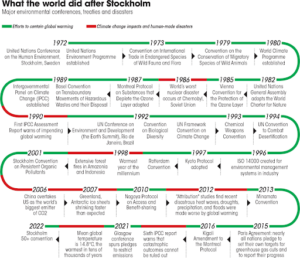In news– United Nations (UN) in a historic resolution has recently declared that every person on the planet has the right to live in a clean, healthy environment.
About the declaration-
- The UN resolution has underlined that Climate change and environmental degradation are the most critical threats awaiting humanity in the future.
- The newly recognised right will be crucial to tackling the triple planetary crisis. This refers to the three main interlinked environmental threats that humanity currently faces: climate change, pollution and biodiversity loss – all mentioned in the text of the resolution.
- The landmark development demonstrates that the member states can unite in the collective fight against the triple planetary crisis of climate change, biodiversity loss and pollution.
- The resolution will help to reduce environmental injustices and protection gaps.
- The declaration sheds light on almost all the rights connected to the health of our environment.
- This right was not included in the Universal Declaration of Human Rights, 1948. So, this is a historic resolution that will change the very nature of international human rights law
- Some 50 years ago(in 1972), the United Nations Conference on the Environment in Stockholm concluded with a resolution placing environmental issues at the global forefront.

- The 1972 conference ended with its own historic declaration, was the first one to place environmental issues at the forefront of international concerns and marked the start of a dialogue between industrialized and developing countries on the link between economic growth, the pollution of the air, water and the ocean, and the well-being of people around the world.
- UN Member States back then, declared that people have a fundamental right to “an environment of a quality that permits a life of dignity and well-being,” calling for concrete action and the recognition of this right.
- Today, over 176 countries have adopted environmental framework laws on the basis of it. From a foothold in the 1972 Stockholm Declaration, these rights have been integrated into constitutions, national laws and regional agreements.
- In October 2021, it was recognised by the UN Human Rights Council.
- July 28, 2010, the UN general assembly recognised the right to water and sanitation through its resolution. It stated that clean drinking water and sanitation “are essential to the realisation of all human rights”.
- The declaration(on right to a healthy environment) was adopted by over 160 UN member nations, including India, is not legally binding.
- But, it will encourage countries to incorporate the right to a healthy environment in national constitutions and regional treaties.
- Russia and Iran abstained from voting.
Source: Down To Earth
















